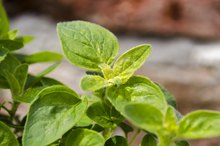Holy Basil Interactions
A cousin to the famous sweet basil of Italian pesto fame, holy basil has been used medicinally for thousands of years. Ocimum sanctum, known as either holy basil or tulsi, originated in India. Fans of all-natural cures may find holy basil useful for easing stress and building immunity. But even herbal medicines have their dangers. Always check with your doctor to confirm that holy basil won’t interfere with any prescription or over the counter medicine you may be taking.
If you are experiencing serious medical symptoms, seek emergency treatment immediately.
Description
Holy Basil is so revered in India that it carries the honorary title “Queen of Herbs,” according to the University of Michigan. Researchers have identified a number of therapeutic compounds in holy basil’s leaves and stem, including eugenol, tannins, triterpenoids, saponins and flavonoids. Look for dried holy basil either in capsule or tea form.
Uses
Interactions With Olive Leaf Extract & Blood Thinners
Learn More
Holy basil's role in ancient medicine includes treating colds and coughs, boosting immunity, relieving stress and fighting fevers and headaches. The University of Maryland Medical Center specifically recommends it to fight stress related to post traumatic stress disorder, bulimia and hypoglycemia. It may also help protect the body against the ravages of radiation treatment, according to UMMC.
- Holy basil's role in ancient medicine includes treating colds and coughs, boosting immunity, relieving stress and fighting fevers and headaches.
- It may also help protect the body against the ravages of radiation treatment, according to UMMC.
Concern
While two pharmaceutical drugs interacting with one another may produce a toxic reaction, herb-drug reactions tend to possess their own characteristics, points out Subhuti Dharmananda, director of the Institute for Traditional Medicine in Portland, Oregon 1. Herbs may affect drugs by making them either more or less potent. The consequences are potentially dangerous, even fatal. Making antibiotics less effective opens the door for a dangerous infection to spread, while making anti-diabetic medicine more potent could conceivably drop blood sugar to unhealthy levels. Other common concerns include making blood thinners either too effective or rendering them ineffective, leading to clots or blood loss. Herbs which lowering the effectiveness of a blood pressure medication interfere with that drug's ability to prevent strokes or hypertension.
- While two pharmaceutical drugs interacting with one another may produce a toxic reaction, herb-drug reactions tend to possess their own characteristics, points out Subhuti Dharmananda, director of the Institute for Traditional Medicine in Portland, Oregon 1.
- Other common concerns include making blood thinners either too effective or rendering them ineffective, leading to clots or blood loss.
Known Interactions
Rhodiola Interactions
Learn More
Holy basil may interact negatively with prescription blood thinners or aspirin, according to the University of Maryland Medical Center. Specifically, the blood thinner warfarin, also known as coumadin, may make be affected, in this case making the medicine overly effective and causing excessive bleeding. This risk also exists for people taking aspirin as blood thinners, notes UMMC. Another potential hazardous interaction relates to the sedative pentobarbital. Check with your doctor about additional interactions which may be newly uncovered concerning holy basil if you are taking the herb.
- Holy basil may interact negatively with prescription blood thinners or aspirin, according to the University of Maryland Medical Center.
- Specifically, the blood thinner warfarin, also known as coumadin, may make be affected, in this case making the medicine overly effective and causing excessive bleeding.
Side Effects
The only currently known side effects involve a possible impact on fertility, according to the University of Michigan Health System. Those effects, however, were noticed in laboratory studies, not during human trials. As with many herbs, holy basil’s safety has not been studied in association with pregnancy and lactation and is therefore not recommended for pregnant and nursing mothers.
- The only currently known side effects involve a possible impact on fertility, according to the University of Michigan Health System.
- As with many herbs, holy basil’s safety has not been studied in association with pregnancy and lactation and is therefore not recommended for pregnant and nursing mothers.
Related Articles
References
- Institute for Traditional Medicine: Checking for Possible Herb-Drug Interactions
- Cohen MM. Tulsi - Ocimum sanctum: A herb for all reasons. J Ayurveda Integr Med. 2014;5(4):251-9. doi:10.4103/0975-9476.146554
- Jamshidi N, Cohen MM. The clinical efficacy and safety of tulsi in humans: A systematic review of the literature. Evid Based Complement Alternat Med. 2017;2017:9217567. doi:10.1155/2017/9217567
- RX List. Holy basil. Updated June 18, 2019.
- RX List. Vitamins, Herbs, Dietary Supplements A-Z List. Holy Basil. RxList.com. Updated June 18, 2019
- Drugs.com. Holy basil. Updated January 1, 2019.
- Rindels, S. Basil. Iowa State University, Horticulture and Home Pest News. Updated March 21, 1997
- Cohen MM. Tulsi - Ocimum sanctum: A herb for all reasons. J Ayurveda Integr Med. 2014;5(4):251-9. doi:10.4103/0975-9476.146554
Writer Bio
Ellen Douglas has written on food, gardening, education and the arts since 1992. Douglas has worked as a staff reporter for the Lakeville Journal newspaper group. Previously, she served as a communication specialist in the nonprofit field. She received her Bachelor of Arts from the University of Connecticut.









